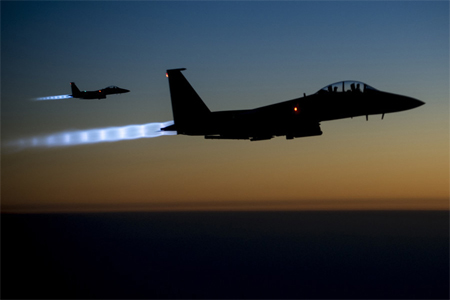
Afrasianet - US-led coalition warplanes have bombed several Syrian army positions in the eastern Syrian province of Deir ez-Zor, state media outlet SANA reports, citing a military source.
The attack took place shortly after midnight on Thursday. SANA reported that the US-led coalition aircraft inflicted limited material damage and no casualties. The airstrikes, which hit near the city of Al-Bukamal, were reportedly coordinated with anti-government militants.
Earlier, Lebanon’s Hezbollah group, an ally of the Syrian forces in the fight with Islamic State (IS, former ISIS/ISIL) said the coalition jets targeted two Syrian army outposts, including an energy installation near the Iraqi border.
The area has seen rapid advances by the US-backed Syrian Democratic Forces (SDF) pushing against IS militants near Al-Bukamal and moving towards the eastern bank of the Euphrates River.
Last week, the SDF announced they took control over a former IS base on the Euphrates River near the Syrian-Iraqi border, moving closer to territory controlled by the Syrian government.
Syria has recently been subjected to massive bombardment campaigns by another US ally, Israel, which in early May sent 28 fighter jets that fired some 60 air-to-surface missiles into Syrian territory against what Tel-Aviv claimed were targets belonging to the Iranian Revolutionary Guard. Israel said that its largest attack in years was a response to Iran’s launching an attack on the Israeli-controlled part of the occupied Golan Heights from Syria. The Syrian air defenses retaliated, allegedly firing some 100 missiles at Israeli warplanes.
Pentagon spokesman Captain Bill Urban said the US military is not aware of any coalition-led operation against the Syrian government.
"We have no operational reporting of a US-led coalition strike against pro-Syrian regime targets or forces," Urban told Reuters.
However, Dave Lindorff, the founding editor of the news site ‘This Can’t Be Happening,’ told RT that the attack seems to follow the same objective Washington has long pursued, which is to prop the rebels against the Syrian government.
“We know the US has been supporting and arming elements of rebels against Assad and that is what they are really up to in Syria. It would not be surprising if they saw Syrian forces offering some threat to elements that the US is supporting that they would continue the policy of attacking Syrians,” Lindorff said.
US-led forces have been actively engaged in the region in the past few years and repeatedly hit Syrian army positions here, former US diplomat Jim Jatras reminded.
“It’s certainly not the first time. We have many instances where US planes or coalition planes have hit Syrian government or allied forces in eastern Syria, especially,” Jatras said. Referring to the US-led strikes in September 2016 that killed 60 Syrian troops near the city of Deir ez-Zor, he said that the attack “almost seemed coordinated with ISIS attacks on Syrian positions.” The coalition then claimed it had no intention of targeting Syrian soldiers, saying it mistook them for ISIS fighters.
Speaking of the chances of a tit-for-tat response from the Syrian forces, Jatras said that Damascus would not likely fall for provocation.
“I don’t think there’re any expectations they come back and target American or coalition forces. It seems that what they generally have done in the past is to stick to their game plan,” Jatras said, arguing that instead of giving the US-led forces a pretext for a larger attack, the Syrian forces would continue to try to clean up the area in the east from terrorists.
“I’m not sure that’s going to stop them from reaching their objectives in this part of the country,” he said.
The US administration's policy in the region has been aimed at escalation and military confrontation, Brian Becker, National Coordinator of the ANSWER Coalition, said, pointing to the increasingly hawkish mood in the Trump cabinet, staffed with the likes of National Security Adviser John Bolton and Secretary of State Mike Pompeo.
“I think the US, the Pentagon, the Trump administration and the Israeli government have the same solution which is to intensify military pressure on all of these entities that they consider to be part of the resistance front against plans for hegemony in the region,” Becker told RT.
“That would include Iran, that would include the Syrian government because it’s survived, Hezbollah, which has been getting stronger, and Lebanon.”

